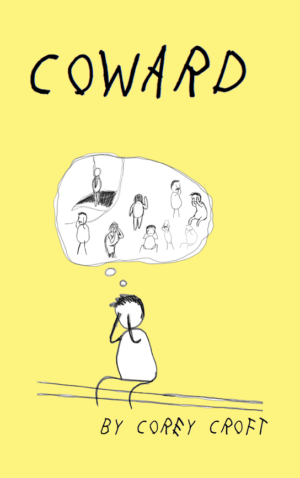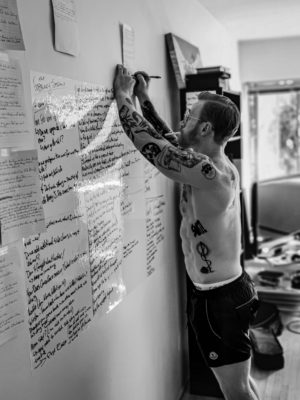1) JT: Why did you write Coward?
CC: Short answer: I was frustrated with all of the things around me.
 A longer answer, and the true genesis of the story was a drizzly Vancouver morning. I hopped on the bus to go and read at the coffee shop beside my work for a bit before a morning opening shift. I sat in the back and someone got on at the next stop. It apes exactly what the character does on the morning Sam learns of his power. I was tired. I was mega frustrated with my job and not being able to get one that slaked the ego that I’d earned from grad-school. I found the person to be acting obnoxiously, seemingly unaware of a certain bus etiquette that I had quite possibly made up. I was in a state of anomie. You see, I managed at a restaurant, a job where you have to maintain a certain degree of courteousness; but I come from an area with a near-prison mentality about respect. If I would have even begun to politely ask the person to quiet down, I felt like I’d get up and tear their fucking face off. I was getting enraged so easily during this period by the trivial rudeness I encountered in everyday life, like Sam, and I couldn’t brush anything off. I felt violent all the time and it scared my girlfriend. I was actually scared of the consequences of what might happen if I dropped the hospitality façade and gave in to the dark thoughts entirely. I daydreamed for an easier solution…
A longer answer, and the true genesis of the story was a drizzly Vancouver morning. I hopped on the bus to go and read at the coffee shop beside my work for a bit before a morning opening shift. I sat in the back and someone got on at the next stop. It apes exactly what the character does on the morning Sam learns of his power. I was tired. I was mega frustrated with my job and not being able to get one that slaked the ego that I’d earned from grad-school. I found the person to be acting obnoxiously, seemingly unaware of a certain bus etiquette that I had quite possibly made up. I was in a state of anomie. You see, I managed at a restaurant, a job where you have to maintain a certain degree of courteousness; but I come from an area with a near-prison mentality about respect. If I would have even begun to politely ask the person to quiet down, I felt like I’d get up and tear their fucking face off. I was getting enraged so easily during this period by the trivial rudeness I encountered in everyday life, like Sam, and I couldn’t brush anything off. I felt violent all the time and it scared my girlfriend. I was actually scared of the consequences of what might happen if I dropped the hospitality façade and gave in to the dark thoughts entirely. I daydreamed for an easier solution…
2) How did you develop the characters in Coward?
CC: I like to observe people. It’s a love-hate relationship that I have with the species. While I love solitude, I need do be around people; they feed my writing. Most of the characters are based on real people, some I know, some I don’t. Of course, you break the knob when you turn the volume up to make them interesting. I told some people I was writing characters based on them; some guessed or assumed (correctly and incorrectly) that they influenced certain characters; others may never read the book and others still will never know. Lucy is my favourite character and he is based on as many as ten different sources of inspiration, most of them fictional.
3) Which character do you identify the most with from Coward?
CC: Sam. Straight up. At that time, I was very negative, though far more confident and aggressive than Sam. I don’t think I was as histrionic, though his internal dialogue came from somewhere in me. I hate Sam. I hated thinking and harbouring those weak emotions. I used Sam as a springboard to shake that mental state and make me realize how awful these thoughts and pent-up aggressions were. He’s an outlandish exploitation of everything that I hate, and I used this excessiveness and his abhorrent cowardice as a warning to myself not to give in. He’s everything I never want to be. In that sense, the dialogue between Lucy and Sam are my own thoughts, with a bit more juice in the gills.
4) Would you describe Lucy as a hero or antihero?
CC: I don’t seem him as either. He is more of a neutral force, a beast of exposition, and a chance to succour my own bad habit of ludicrous verbosity that I’ve heard can plague my writing if not contained. He is a trickster, he’s puckish, but I don’t believe that he has any interest beyond his own entertainment and amusement. He is arguable amoral, so his intentions are neither good or bad.
5) Do you know folks like Sam and would they act the same way with such an opportunity?
CC: The way Sam acts when he is bestowed with his powers are a kind of critique against the ‘nice-guy’ movement that you see on the internet on message boards like Reddit. I don’t think any of my friends would react in this way, but everyone has a dark side to them. Instead, it’s what I think would happen if the brittle and affected ‘nice’ guys (and girls, I suppose) of our society were given the opportunity of having such puissance to even the playing field.
6) What is your favorite theme in Coward and why?
CC: There are so many conversations that happen in the book, narrowing it down to one is difficult. I would have to say that the central theme, the one that I think shines through the most, is to take accountability for your own existence and not to float like a piece of debris in the ocean of life. The existential discourse is one that comes up in a lot of my writing and is something that I see as beneficial for people who experience doubt, anxiety, and hopelessness. You are the bullet, the rifle, and the shooter, so to speak. The perception you maintain of yourself equates to how you see the world works as a feedback loop to impact how the world sees you. The novel can play like a cautionary tale about self-improvement with a ‘be better’ ethos; but to me, it boils down to a theme of perception and the self as an indefinite clay-like substance that has to be reshaped with culture and society.
7) Who do you hope will read Coward?
CC: Everyone! The targeted audience is multi-gender with a generous age range. I think men will identify with Sam, as he has a particular masculine sense of inferiority. That isn’t to say that women won’t see some of themselves in Sam’s feelings of inadequacy and in his province of complete frustration. The supporting cast (Andy and Kay in particular) are interesting characters who have appeal and carry their own segments with unique and relatable personalities. Kay, in particular, being a young woman who is tired of men with Asian fetishes has earned some comments. There is a lot of social commentary throughout, which I’d used to figure out my own thoughts about complex issues in today’s cultural gauntlet. Finally, it’s written and edited with flow and poetry in mind. It should appeal to those who appreciate thoughtful character development and unique prose.
8) Which authors or works inspire your creative process?
CC: I didn’t grow up a reader. I don’t think I ever read a book for leisure until I was in my mid-twenties. I grew up on rap music, and I think that I absorbed the hustle and grind of the rap game as a way to dedicate myself to creating. Still, I am a huge Kafka and Doestoevsky fan, and the image of these pained geniuses burning candles until the late night, by themselves, in ruthless poverty is a quick can of kerosene whenever I get speed wobbles. I love exploring the depths of a character’s psyche and creating an authentic backdrop for the story to take place. More than anything, and this would be the result of film, music, and literature, I use the constellations of influences to push me to be new and be different. If I suspect a fence or a wall, I want to break it down and invert tropes. These influences helped me to realize that the only boundaries are those we set for ourselves and that saying anything with confidence and without remorse means its believable.
9) Why did you choose this ending (without disclosing too much—no spoilers)?
CC: It’s just. I deplore a happy ending for the sake of a cheap pop. The same goes for any artificial or contrived ending; it makes the time invested and journey we just went on seem disingenuous and unworthy. I knew the ending the moment the idea came to me on that bus ride. I knew how Sam’s journey would end. I worked backwards from there and had to devise the steps for our hero to get to the climax.
10) What did you enjoy most about writing Coward?
CC: Venting my own frustrations with a life I felt that I had no control over. It was the third book that I wrote. It was at a time when I was writing for a cheap brand of medicine and enjoyed it. It was holing me away from friends and lovers, but I didn’t care. It was an explosion of frustrating confusion that fucked with my brain to no end. I enjoyed creating a far-fetched version of myself and adding everything that I hate about other people and things around me I couldn’t understand. I squashed a lot of intrinsic beefs. It felt good to air those motherfuckers out.
11) Do you have plans to expand on the topics discussed in Coward in future publications?
CC: There is always a variety of existential tenets in my writing. I noticed this while editing short stories and my other novels. There is a premier focus on personal accountability and the world being seen and appraised through the individual’s optics, rather than the reverse. Coward did what it had to do as far as the social commentary on certain subjects goes, and I have so much more to say and seek to understand. My blog brings up some of the principles in Coward in a stream-of-consciousness platform, but Coward was very area-specific as far as its cultural topics.
12) What do you have coming out next?
CC: I am releasing a book called The Furies in September. It is a completely different story in tone, subject matter, location, era, everything really. It is a gritty and grimy young adult and teen fiction based on my home town of Surrey. It really draws on 90’s rap influences and creates a very immersive and nostalgic setting. It is both heartfelt and harrowing. It’s another deep exploration of characters with a lot of action and suspense. I’m almost done editing the first novel I wrote called Becoming Buddha, which I plan to release in December 2019. It is, again, a very different story with very dark themes, especially sex and violence. It’s a jarring read. I have another book, a Swedish-noir sci-fi book with the working title of Our Hero: Fredrick planned for 2020 and have just finished the first part of a series called The February Sessions whose first book is called Scumbag Rehab. Again, a very different book that really embraces ultra-dark urban themes. Not to mention a host of short stories only on the website that allow me to exercise outside of any previous box; two recent ones are called That’s lovely dear and All Teeth, the latter being my favourite story ever.
13) Why the title Coward?
CC: At the time, I was a manager at an oyster bar in Vancouver with an all male staff. Very fraternal with everyone close as brothers. Of course, we took the piss 99% of the time and called each other names, for conduct or otherwise. Coward was the best one because it called a guy out and cut quite deep. I’d say my friend Chan coined the oft-usage of the insult and it soon became almost affectionate. I shout out the lads in the liners and based a couple characters off my coworkers at that place. Based on my repugnance for Sam, it made sense.
14) Any thoughts for readers before they read Coward?
CC: Go in with an open mind and get ready to either identify with Sam or view him as a completely exotic specimen. If it’s the latter, congratulations, you are the 1% of well-adjusted, happy, and mentally fit bastards roaming around in benign bliss with their life reading like an instruction manual. For everyone else, learn from Sam. Love him and/or despise him, or both. I bonded with the story like I did with Fight Club. Even as I was writing it, I felt challenged all the way to my viscera, but I was entertained. And that’s what I want, almost exclusively: to entertain people with my stories.
 Corey Croft is from Surrey BC, Canada. He is a self-aware, self-possessed and self-described poet-warrior. He developed his love of story-telling by spending long hours in isolation talking in plain voice to absolutely no one, and finds it strange that he is currently referring to himself by ‘he’ and ‘him’. His biggest fears are rats and the ocean, while his turn-ons include hawkish noses, the combat-like use of alliteration, and a Prussian work ethic.
Corey Croft is from Surrey BC, Canada. He is a self-aware, self-possessed and self-described poet-warrior. He developed his love of story-telling by spending long hours in isolation talking in plain voice to absolutely no one, and finds it strange that he is currently referring to himself by ‘he’ and ‘him’. His biggest fears are rats and the ocean, while his turn-ons include hawkish noses, the combat-like use of alliteration, and a Prussian work ethic.

